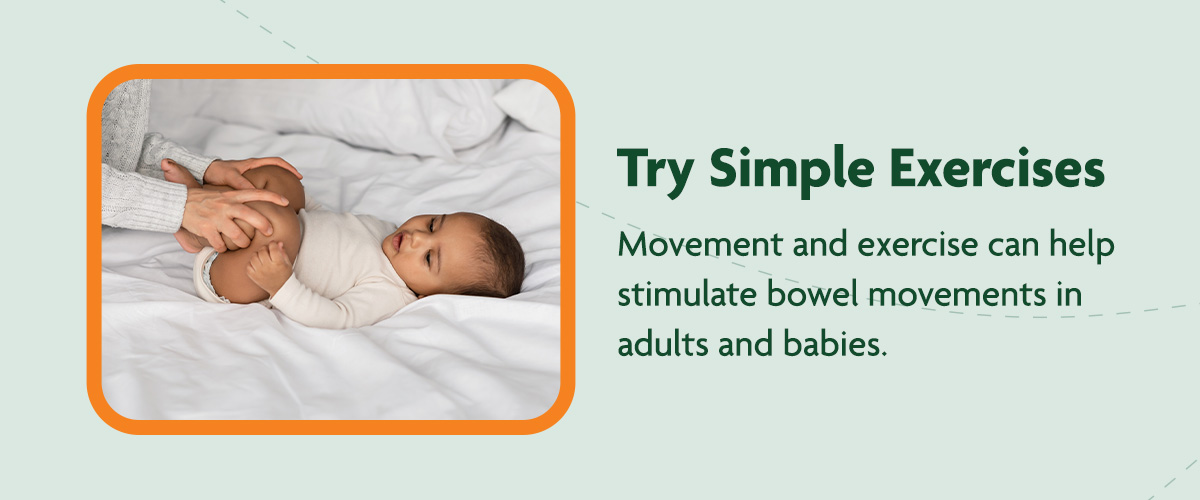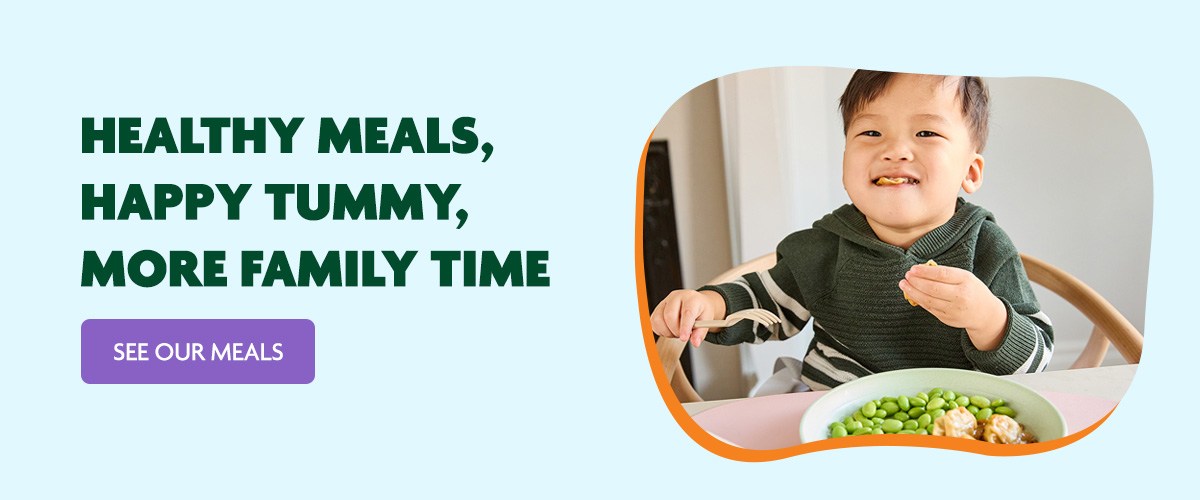Tips for Easing Your Baby’s Constipation
Being a parent is exciting and busy, and when your baby is struggling with constipation, it can make things challenging. Infant constipation is typically defined as having fewer bowel movements or passing hard, dry stools, often causing discomfort for your little one.
We’ll share helpful tips for easing your baby’s constipation so you can both enjoy special moments more comfortably.
Symptoms and Signs of Constipation in Babies
It can be hard to tell whether your baby is constipated. Although the main symptom of infant constipation is hard, dry stools, there are other signs to look out for in your baby:
- Passing fewer stools
- Straining while trying to pass a stool
- Being fussy, crying, and spitting more than usual
- Experiencing abdominal discomfort or pain, bloating, distension, and a hard belly
- Showing changes in stool consistency. From soft to hard
- Blood is present in their stools or diapers
- Eating less with fewer feeding sessions
In general, infants may defecate four times daily, but that will vary depending on your baby’s own pattern.
5 Tips to Ease Infant Constipation
If you think your baby is constipated, there are various home remedies you can try, ranging from dietary changes to gentle massages.
1. Introduce Fiber-Rich Foods
Dietary fiber is an essential component that helps relieve constipation by bulking and softening stools. So, how much fiber does an infant need? There is no recommended daily amount for children under 2 years old. However, caregivers can serve various fruits, vegetables, and easily digestible starches to their babies as long as they’re accompanied by enough fluids.
Fiber-rich foods you could introduce into your little one’s diet after starting the weaning journey include:
- Vegetables like peas, green beans, broccoli, and carrots
- Fruits like apples, pears, blueberries, strawberries, bananas, and plums
- Starchy foods like oats, pasta, rice, and sweet potatoes
Making dietary changes for infants will require some trial and error. Introduce new fibrous foods gradually, trying one simple ingredient at a time. If your baby is too young for solid food, you can try baby-friendly puree recipes to see how they react. Alternatively, you can opt for finger foods once your baby is old enough.
2. Keep Baby Hydrated
Hydration and fiber are like two peas in a pod. While fiber helps form a baby’s poop, hydrating liquids help keep it soft, making it easier to pass. Ensure your baby is hydrated with age-appropriate fluids, such as:
- Breastmilk
- Formula
- Water
- Juice
- Hydrating foods like watermelon, strawberries, carrots, and zucchini
If your baby is still on breastmilk or formula, then they typically don’t need supplemental liquids.
3. Perform Tummy Massages
Sometimes, a gentle tummy massage can help. Abdominal massages help promote the contractions responsible for moving stools through the digestive tract.
Here’s a simple step-by-step guide for gentle tummy massages:
- Warm your hands.
- Lay your baby down flat on their back.
- Place your fingertips just below their belly button.
- Massage the area in a clockwise motion for one minute, being gentle.
- Hold your baby’s ankles, press one leg against their chest, and hold for a few seconds. Repeat with their other leg.
You can massage your baby with their clothes on. However, skin-to-skin contact provides that extra warmth that could further help with their constipation. If you’re also going diaper-free during this session, ensure there is something underneath in case your baby has a bowel movement.
4. Try Simple Exercises

Movement and exercise can help stimulate bowel movements in adults and babies. Although infants may not know how to crawl or walk yet, parents can intervene by performing gentle, simple motions.
One exercise to try is “bicycle legs”:
- Lay your baby down flat on their back.
- Hold your baby’s legs and gently turn them in a cycling motion.
It’s a simple exercise that helps their stomach muscles move, gently putting pressure on their intestines to stimulate a bowel movement.
5. Give Baby a Warm Bath
A nice warm bath can help calm and relax your baby’s muscles, including those in their abdomen. The warmth of the water may stimulate their digestive system, making it easier for them to pass stool.
It’s also a comforting experience for your baby that may alleviate stress and discomfort caused by constipation. Feel free to give their tummy a gentle, circular massage to further encourage a bowel movement.
Just remember to keep the water at a safe, lukewarm temperature.
Causes of Infant Constipation
There are various possible causes of infant constipation. Reasons can vary depending on your baby’s age, diet, and health. Some of the most frequent causes include:
- Dietary changes: Switching from breast milk to formula can be tough on a baby’s tummy as formula is sometimes harder to digest. Starting solids can also slow things down as their little digestive system adjusts to new foods.
- Dehydration: If your baby isn’t drinking enough breast milk, formula, or water, their stools can get hard and dry. Without enough fluids, it’s much harder for them to poop comfortably.
- Low fiber intake: Once solids are introduced, low-fiber foods like rice cereal or processed snacks can worsen constipation.
- Immature digestive system: Babies’ digestive systems are still learning how to work properly, especially in those first few months. Sometimes this means their pooping schedule isn’t quite regular yet.
- Holding stool: Older babies might hold in their poop because it feels uncomfortable or they’re still getting used to the sensation. Unfortunately, the longer they hold it in, the harder and more painful it can become.
- Underlying medical conditions: In rare cases, constipation might be caused by a medical condition. If you’re worried, a quick check with the pediatrician can help rule these out.
Healthy Meals, Happy Tummy, More Family Time
Life is busy enough, and adding a constipated baby to the mix can make it feel overwhelming. That’s why we’re here to help you save time without compromising on nutrition. Nurture Life’s Baby Finger Foods are the perfect solution for you and your baby.
Our food philosophy focuses on fresh veggies in every delicious and nutritious meal, so you can rest assured your baby’s self-feeding journey is off to a great start. Let us help take the stress out of mealtime and give you more time to focus on what matters most — enjoying precious family moments.
Ready to make mealtime easier and support your baby’s digestive health? Order from Nurture Life today and discover the convenience of healthy, nutritious meals delivered right to your door.
FAQ
1. What are the signs of constipation in babies?
Signs that your baby may be constipated include fewer bowel movements, straining while trying to pass stool, abdominal discomfort or bloating, and harder, dry stools. If you notice any of these symptoms, it’s important to monitor your baby’s bowel habits closely. Consult your child’s health care provider if you are concerned.
2. How to treat constipation in babies?
To help relieve constipation in babies, try making simple changes like introducing fiber-rich foods (once your baby has started solid foods), ensuring they stay hydrated with breast milk, formula, or age-appropriate liquids, and performing gentle tummy massages. A warm bath can also help relax their muscles and promote bowel movements.
3. Can a warm bath help with constipation in babies?
Yes, a warm bath can help ease constipation in babies. The warmth can relax your baby’s abdominal muscles, potentially making it easier for them to pass stool. It also provides comfort, which can help alleviate any discomfort caused by constipation.
4. What are some fiber-rich foods to introduce to help with constipation?
Fiber-rich foods like peas, carrots, apples, pears, and sweet potatoes can help relieve constipation. These foods help bulk up and soften stools, making them easier to pass. Start introducing these foods gradually, and make sure your baby is well-hydrated for the best results.
5. Is it normal for my baby to have fewer bowel movements?
Yes, it is normal for babies, especially infants, to have varying bowel movement patterns. Some babies may go several days without having a bowel movement, especially if they are breastfed, as breast milk is highly digestible. However, if your baby is showing signs of discomfort, straining, or passing hard stools, it may be a sign of constipation.
6. How can I tell if my baby’s constipation is worsening?
If your baby is having fewer bowel movements, seems more fussy or uncomfortable, or is straining more than usual, their constipation may be worsening. If you notice blood in their stool or persistent discomfort, it’s important to consult with your child’s health care provider for further evaluation and guidance.
7. How long can constipation last in babies?
Constipation in babies can last for a few days, especially when there are changes in diet or feeding habits. If your baby’s constipation continues or they show signs of significant discomfort, it’s important to consult with a pediatrician to rule out any underlying issues.
8. What Foods Help Baby Poop?
The four P’s, peaches, pears, plums, and prunes, can help babies poop. Other fibrous foods include whole grains, fruits, and vegetables.
9. Can Formula Cause Constipation?
Yes, some formulas can be harder for babies to digest. If constipation is persistent, talk to your pediatrician about switching to a different formula.
10. How Can I Help My Baby if They’re Constipated but Are Too Young for Solid Foods?
For younger babies, make sure they’re well-hydrated with breast milk or formula. You can also try gentle tummy massages or moving their legs in a bicycle motion to relieve gas and promote digestion.
11. Is It Safe to Give My Baby Stool Softeners or Laxatives?
Always consult your pediatrician before giving any medications, including stool softeners or laxatives. Most pediatricians will suggest natural remedies or a change in diet before considering medication.

